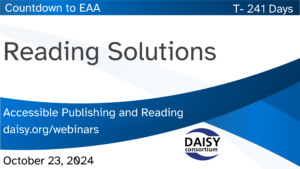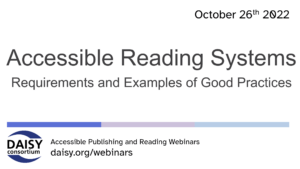Reading Solutions, T-241 (W)
 In our series of EAA monthly webinars October 23rd saw a session that explored innovations being made to improve the accessibility of reading solutions. Ensuring people can read accessible ebooks across a variety of different platforms, customizing the presentation of that content, and supporting the use a diverse range of assistive technology is far from a simple task. This page contains:
In our series of EAA monthly webinars October 23rd saw a session that explored innovations being made to improve the accessibility of reading solutions. Ensuring people can read accessible ebooks across a variety of different platforms, customizing the presentation of that content, and supporting the use a diverse range of assistive technology is far from a simple task. This page contains:
This page contains:
Full Video of the Webinar
Speakers
- Richard Orme, The DAISY Consortium—host and chair
- Terra Masiel, Amazon
- Wendy Reid, Rakuten Kobo
- Daniel Weck, EDRLab
Session Overview
Richard Orme introduced the speakers reminding us all that the term “reading solution” covers a vast range of unique solutions, benefits, accessibility features and challenges.
Terra Masiel
Amazon distributes millions of ebooks every year, ingesting content in many formats that needs to be converted to the kindle format for distribution. To support publishers in their efforts to supply accessible content, the team at amazon communicates best practice for accessibility, which must then be retained during the conversion process to the kindle format. To help with this there are a number of innovations afoot eg – a new approach to math is being brought in with support for mathml on some of the amazon reading solutions and will be rolling out to more shortly. To do this amazon have had to develop solutions for each reading system as they are all different – by leaning into user patterns for each device the result is an intuitive reading experience for each individual device or system. This bespoke approach can also come with it’s own challenges and amazon continue to work to align the accessibility gaps that are inevitable.
Reading system development is challenging, not least because the act of reading is very personal and Terra and colleagues are working to support the various user requirements, preferences and needs of readers. Understanding that these can vary greatly is imperative to this work.
Wendy Reid
Rakuten Kobo factor accessibility concerns into the ingestion and display of all ebook material and Wendy shared with us a list of points that publishers should consider when submitting content:
- Test your content via epubcheck and Ace by DAISY
- Check content on a variety of screen sizes
- Design for flexibility
- Separate files for each part of the book
- Right-size your images
- Embed fonts for special characters and unusual scripts
- Don’t use non ASCII characters in file names
- Submit EPUB 3 files
A particular issue for Kobo is that they have multiple reading solutions available to readers on multiple platforms, all with different accessibility requirements. When combined with individual user preferences and hardware challenges, innovations can be challenging. Developing reading system accessibility is a complex task and there are many layers to ensuring that the reading experience is as accessible as possible.
When developing reading solutions Kobo test using a wide variety of assistive technology with a particular focus on screen readers, keyboards and magnification use cases initially.
User testing has been the most informative way to understand the impact of our efforts, and to research new features and approaches to features.
Daniel Weck
Daniel spoke to us about the Thorium reading system, a free reading solution built with open source software. With desktop technology developing at a fast pace there are many creative opportunities to implement accessible user experiences. One of Thorium’s main objectives has always been to meet the needs of users with diverse abilities by combining visual, auditory and touch reading opportunities (reading with eyes, ears and fingers) and Daniel gave us examples of these within his presentation. EDRLab rigorously test Thorium with users with lived experience to make sure that the reading solution works seamlessly with assistive technology. Input at the design and implementation phases has been crucial.
It’s worth pointing out the that underlying operating system being used can affect the reading experience and, in some cases, unlock additional features. This can be challenging for Daniel and colleagues as they endeavour to provide a uniform experience across platforms.


 In our series of
In our series of